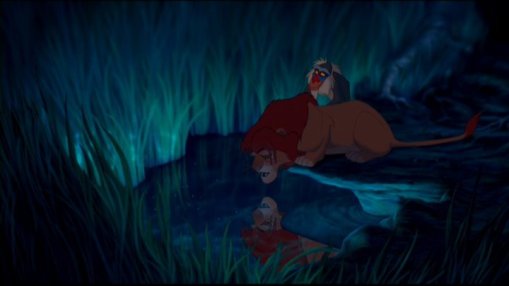The other day I was sitting in the waiting room at a doctor’s office to have my ears checked out, but began to wonder if I shouldn’t talk to him about hormones as well, because I found myself fighting back tears 3 times while watching “The Lion King”.
At first I was surprised by my emotion, then a little embarrassed and finally a little curious. Why was a cartoon I’ve seen many times before getting to me like that? I realized it was because God was using it as a tool to send me a message. Stick with me now.
There is a part in the movie when Nala discovers that Simba isn’t dead and is happy and hopeful thinking that he is the rightful king who will come back to set things straight and make a change for good. However, Simba denies his position and quotes his new friends, Timon and Pumbaa’s, philosophy on life which is basically that you can’t change anything, so why worry? (By the way, “Pumbaa” in Swahili means simpleton, stupid or carefree. Side note here might be that your friends/family, as good willed as they may be, don’t always know what they are talking about.)
Nevertheless, Simba runs off to contemplate his new dilemma and runs into Rafiki, the wise mandrill, whose name in Swahili means “friend”. He listens to Simba talk about regret and shame and then shows him that his father is still alive because he lives in him. He still has fear and doubts himself until his father’s spirit appears in the clouds and tells Simba that he has forgotten him. Simba quickly responds, “Never”, but Mufasa replies, “You have forgotten who you are and so you have forgotten me.”

As Believers, we are children of an almighty God and if we don’t live as such, it is because we don’t know who we are or Whose we are. Jesus is alive because He lives in us and we have to stop listening to the world’s accusations and even its nonsense of Hakuna Matata, like life is one big party. While we are distracted by insecurity, selfishness or pride, “Scar” is destroying our lands and oppressing our people.
Whether we are doing the wrong thing or idly doing nothing, we are choosing to listen to the lying king instead of the Lion King. Because Simba believed a lie, he lived a lie until he remembered that he had a calling on his life and a responsibility. We need to remember who we are, reclaim our inheritance and take a stand against the devil’s schemes. Evil is real and it will not just go away no matter how we try to deny it, run from it or ignore it. By the way, Nala, the one who came to Simba to remind him who he was, her name means “gift”. The truth that sets us free is a gift, but we have to choose to accept it and act upon it.
Where have you been hiding? What is the truth of your situation? Who are your real friends? Who do you belong to? What calling have you been running from? What are you going to do about it? Who will suffer if you don’t step up to it? What are you waiting for?
